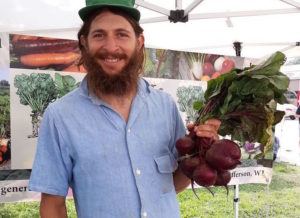
Clint Freund, proprietor of Cultivating the Commons in Fort Atkinson, Wisconsin, produces vegetable seed selected for the short humid summers of the upper Midwest. Though he has lived and worked in other places, he is happy to be growing and offering seed in his bioregion of origin.
Clint grew up in a big family on a small dairy farm in Wisconsin. After studying music in college, he was drawn back to agriculture and began working on a large organic farm near Madison. During this time he began to wonder, “What comes before vegetables? Where does it all start? Why is this cabbage field literally melting from disease?” These questions led him to begin experimenting with seed. He moved to Nebraska for a two-year apprenticeship with experienced seed growers Beth and Nathan Corymb of Meadowlark Hearth before returning to Wisconsin to start Cultivating the Commons.

Cultivating the Commons currently focuses on producing small-scale vegetable seed crops for contract and local retail sale. Though his farm has good conditions for wet-seeded crops, Clint is also experimenting with dry seeded crops, focusing on species and methods of production that can ensure a reliable harvest of organic, disease-free seed. He’s most interested in, and has been successful with, brassicas and cucurbits. “At the moment, it’s been hard to hone in on what we do best,” says Clint, “because it’s all so exciting!”
Clint’s current work with brassicas highlights his belief in the importance of regional seed systems. “Black rot can be a huge problem for brassica production in our region, but it’s not such an issue in the places where crops are more commonly grown for the seed,” says Clint. “As small growers we have a real opportunity to do that selection work and improve varieties in our region. The whole point of regional seed systems is the fact that we are often the experts on our own needs, so we’re best equipped to evaluate and select to meet those needs.”
Clint has many experiments in mind for expanding and streamlining seed production at Cultivating the Commons, including practicing dry seed production in hoop houses or tunnels and developing a network of farmers interested in growing seed adapted to this region. “We’re surrounded by an abundance of organic vegetable growers with decades of growing experience. Naturally we’re excited to make connections with both up-and-coming and elder seed growers looking for possibilities here in the Midwest.”
